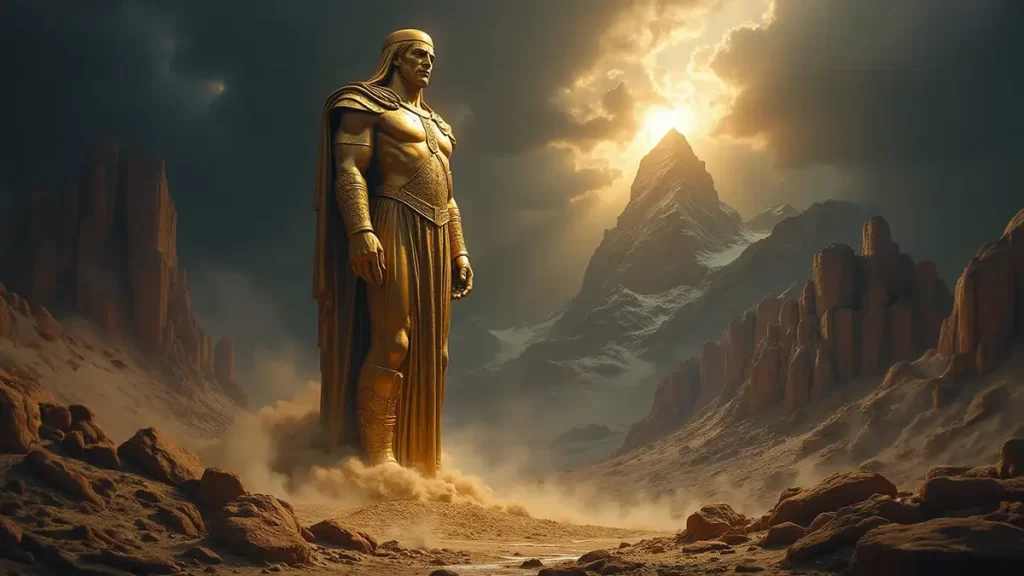Catholic Interpretation of Nebuchadnezzar’s Dream
Now, let’s see how Catholics understand Nebuchadnezzar’s dream. For Catholics, this dream is packed with important messages. The statue with its different metals represents the big empires of history, like Babylon, Persia, Greece, and Rome.
Each empire was powerful in its day, but guess what? None of them lasted forever. They all came and went, just like waves crashing on the shore and then retreating.
Catholics believe the stone that destroyed the statue is like a symbol of Jesus. The stone wasn’t made by human hands—just like Jesus was born from the Virgin Mary, without a human father. When that stone smashed the statue, it was like Jesus coming into the world and starting God’s kingdom, a kingdom that would replace all the earthly ones.
That’s why Catholics see this dream as not just about history, but also about how Jesus brought God’s kingdom to earth and how it’s still growing today.
Catholic teachers often remind us that God’s everlasting kingdom is alive and kicking right now in the Church. The Church is like that mountain that the stone grew into, spreading all over the world. Nebuchadnezzar’s dream meaning teaches Catholics to put their faith not in earthly power or money, but in Jesus and His everlasting kingdom.
Protestant Interpretation of Nebuchadnezzar’s Dream
Alright, let’s flip the coin and see how Protestants view Nebuchadnezzar’s dream. Protestants agree that the dream was all about showing who’s really in control—spoiler alert: it’s God!
The different parts of the statue represent the great empires, starting with Babylon, but Protestants like to emphasize that God is the one who makes or breaks these kingdoms. No matter how strong they are, God decides when they rise and when they fall.

For Protestants, that stone in the dream is all about Jesus and His kingdom. The stone’s sudden appearance and its powerful impact show that Jesus’ kingdom is unlike any other. It doesn’t just take over the world; it transforms it. This kingdom, which God Himself established, will never be destroyed, and that’s something Protestants love to celebrate.
Protestants also take Nebuchadnezzar’s dream meaning as a big reminder that all human power is temporary. Even the strongest empires can crumble, just like the statue in the dream. The dream teaches that we shouldn’t put our trust in any human leader or country, but only in God’s everlasting kingdom, which will never pass away.
To Protestants, this dream is also a part of the bigger story of God’s plan for the world. It’s like a sneak peek at how things will turn out in the end, with God’s kingdom standing tall and strong while everything else fades away. Nebuchadnezzar’s dream meaning encourages Protestants to stay focused on what really matters: following God and trusting in His plan.
Comparing Catholic and Protestant Views on Biblical Dreams
So, we’ve seen how both Catholics and Protestants interpret Nebuchadnezzar’s dream. Let’s compare these two views.
Both Catholics and Protestants agree on the basics—the dream shows that human kingdoms won’t last forever, but God’s everlasting kingdom will.
But there are some differences in how they explain what this means.
Catholics tend to focus on how the Church is like the mountain that the stone became, spreading across the world and representing God’s kingdom right here, right now. For them, Nebuchadnezzar’s dream meaning isn’t just about the future; it’s about what’s happening today in the Church.
Protestants, on the other hand, often emphasize the future aspect of the dream. They believe that while God’s kingdom is here now, the full realization of this kingdom will happen when Jesus comes back. So, they see the dream as a promise of what’s to come—God’s everlasting kingdom finally defeating all other powers for good.
Both views remind us that human power is like sandcastles on the beach—impressive for a while, but eventually washed away by the tide. The real power belongs to God, and His kingdom is the only one that’s going to last forever.
The Role of Prophetic Dreams in Christian Life Today
So, what do Nebuchadnezzar’s dream and other prophetic dreams mean for us today? Well, these dreams are more than just cool stories—they’re like messages from God, showing us that He’s in control of everything, even the future. They remind us that God has a plan, and He’s working it out, even when we can’t see the whole picture.
Some Christians believe that God still speaks through dreams today, just like He did with Nebuchadnezzar. These dreams might not be as dramatic as a giant statue getting smashed by a stone, but they can still be important.
They might guide us, warn us, or comfort us when we need it most. God’s everlasting kingdom isn’t just something that’s coming someday—it’s already starting to grow in our hearts and lives.
For other Christians, the main thing about prophetic dreams is that they teach us about who God is. They show us that God knows the future and that He’s got everything under control, even when things seem chaotic.
Nebuchadnezzar’s dream meaning today might not be about predicting specific events, but about reminding us to trust God’s plan.
No matter how we look at it, the key takeaway is the same: God’s everlasting kingdom is real, it’s growing, and it’s going to last forever. And that’s something we can all put our trust in.

